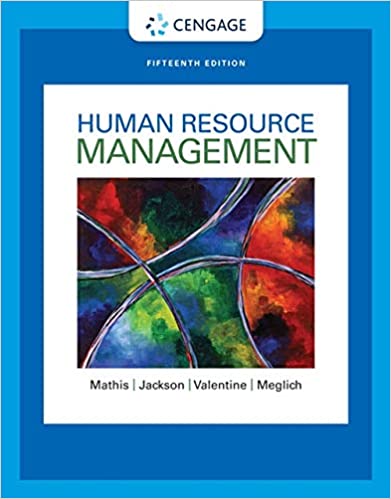
Human Resource Management 15th Edition by Robert Mathis,John Jackson,Sean Valentine ,Patricia Meglich
Edition 15ISBN: 978-1305500709
Human Resource Management 15th Edition by Robert Mathis,John Jackson,Sean Valentine ,Patricia Meglich
Edition 15ISBN: 978-1305500709 Exercise 1
Conducting Exit Interviews
Departing employees may be reluctant to divulge their real reasons for leaving. A skilled HR interviewer may be able to gain useful information that departing employees do not wish to share with managers and supervisors. The following suggestions may be useful when conducting exit interviews:
• Decide who will conduct the exit interview and when the discussion will occur. These interviews can occur on the last day or so of a departing individual's employment, but it might be better to conduct them a few days before because an employee will be less distracted by the upcoming change.
• Emphasize that the information provided by the departing employee will be treated confidentially and used to make improvements.
• Utilize a checklist or a set of standard questions so that the information can be summarized. Typical areas covered include reasons for leaving, supervision, pay, training, liked and disliked aspects of the job, and details on the organization to which the employee is moving.
When doing the actual exit interview, numerous questions can be asked. Those typically asked include the following:
[Q]: Why are you leaving?
[Q]: What have you liked and disliked about your job and managers?
[Q]: What company actions have made you and other employees more or less positive?
[Q]: What would or would not lead you to recommend this employer to future possible hires?
[Q]: Did you receive adequate training and support? Please explain.
[Q]: Did the job match your expectations when you were hired? If not, what failed to meet your expectations?
[Q]: What was frustrating about working here?
[Q]: What suggestions do you have to improve working conditions?
[Q]: Do you believe that any decisions or actions regarding your employment were discriminatory or unfair? Please explain.
Based on these suggestions, consider the following questions:
How would you conduct useful exit interviews?
Departing employees may be reluctant to divulge their real reasons for leaving. A skilled HR interviewer may be able to gain useful information that departing employees do not wish to share with managers and supervisors. The following suggestions may be useful when conducting exit interviews:
• Decide who will conduct the exit interview and when the discussion will occur. These interviews can occur on the last day or so of a departing individual's employment, but it might be better to conduct them a few days before because an employee will be less distracted by the upcoming change.
• Emphasize that the information provided by the departing employee will be treated confidentially and used to make improvements.
• Utilize a checklist or a set of standard questions so that the information can be summarized. Typical areas covered include reasons for leaving, supervision, pay, training, liked and disliked aspects of the job, and details on the organization to which the employee is moving.
When doing the actual exit interview, numerous questions can be asked. Those typically asked include the following:
[Q]: Why are you leaving?
[Q]: What have you liked and disliked about your job and managers?
[Q]: What company actions have made you and other employees more or less positive?
[Q]: What would or would not lead you to recommend this employer to future possible hires?
[Q]: Did you receive adequate training and support? Please explain.
[Q]: Did the job match your expectations when you were hired? If not, what failed to meet your expectations?
[Q]: What was frustrating about working here?
[Q]: What suggestions do you have to improve working conditions?
[Q]: Do you believe that any decisions or actions regarding your employment were discriminatory or unfair? Please explain.
Based on these suggestions, consider the following questions:
How would you conduct useful exit interviews?
Explanation
For Manager and HR professionals, it is ...
Human Resource Management 15th Edition by Robert Mathis,John Jackson,Sean Valentine ,Patricia Meglich
Why don’t you like this exercise?
Other Minimum 8 character and maximum 255 character
Character 255


